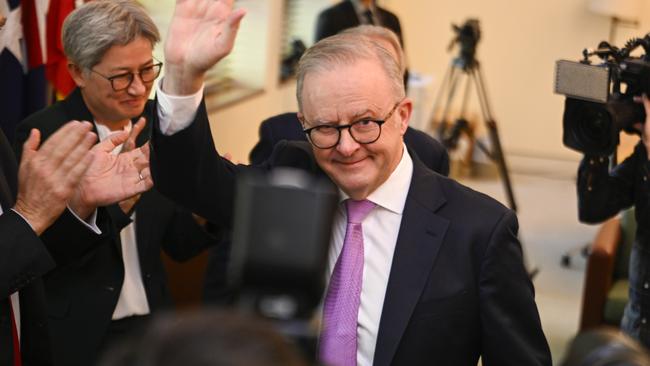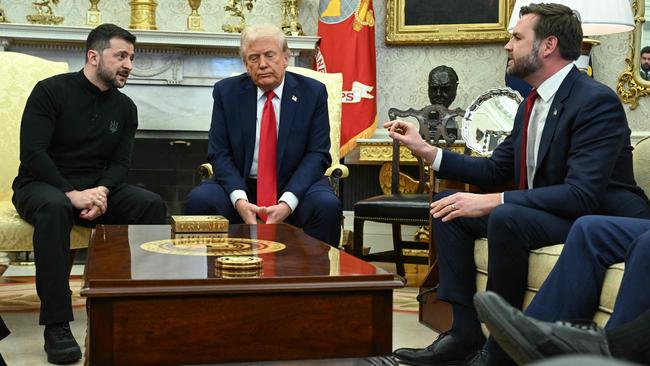Anthony Albanese was on the fast-track to federal election defeat – and then Donald Trump met Volodymr Zelensky | David Penberthy
The polls clearly show the two seismic moments where the right’s anti-woke culture warrior made Anthony Albanese a Labor legend, writes David Penberthy
Opinion
Don't miss out on the headlines from Opinion. Followed categories will be added to My News.
Four weeks ago I made a pact with you the readers that for the remainder of the election campaign I would not file another column on federal politics ahead of polling day.
The theory was that you had all suffered enough and that the tedium of the spectacle did not merit further attention.
With that statute of limitations having now expired, it is worth looking back and trying to work out how such a landslide could emerge from such an uninspired contest.
Results like this usually arise from the sudden emergence of as dynamic new political figure, such as Bob Hawke in 1983.
Conversely, they result from mass disgust at the performance of a government, as per Gough Whitlam’s defeat in 1975, or at the tired end of a largely good government, as per the loss suffered by John Howard in 2007 or the end of the Hawke-Keating era in 1996.
With the exception of the 1975 election, none of those other results were as stark and decisive as the victory registered by Anthony Albanese.

That’s the same Anthony Albanese who during the Voice and the cost of living squeeze was regarded by millions of Australians as hopelessly ineffectual.
The same Albo who in January of this year was touted as a doomed man in every major opinion poll.
How on earth did he pull it off?
The election campaign this most closely resembled to my mind was the 2001 election campaign.
That’s the campaign lefties like to call the Tampa election, as if the result can be explained solely by John Howard harnessing anti-asylum seeker sentiment with the turn back of the ship of the same name, a Norwegian freighter which had picked up 400-odd boat people in the belief they would find safe haven in Australia.
The biggest decisive factor at that election – held on November 10 – wasn’t the Tampa at all. It was, of course, September 11, the attacks on the Twin Towers.
I was out doing what we call vox pops in NSW with a photographer mate, Rohan Kelly, on the day of the attacks.
We arrived in Cessnock late that night, pulling into a cheap motel not long after one of Rohan’s mates had rung telling him to get to a TV as quickly as possible because a plane had just hit the World Trade Centre.
We stayed up all night watching the horror of it all unfold; my parents were on holidays in Canada, my sister was losing her mind as to how they would get back.
The next day I rang my editor and asked him if he wanted us to end our vox pop exercise and return to Sydney to help with the September 11 coverage.
No way, he said.

He wanted us to keep going with our project, which was to interview 1000 people in 10 days in 10 marginal electorates, arguing that the pall of what happened in New York might be the defining moment for the election.
He was right, for as we spoke to all those people on coastal cities along the Pacific Highway, in inland towns such as Gunnedah, Tamworth, Armidale and Tenterfield, it was like the voters had all been given the same script.
“After what’s just happened why would you change now?” was the response we got from almost every voter.
And of all the people we interviewed, only four of them – four – said they thought Kim Beazley would win.
While Howard benefited hugely from this terror-inspired sense of inertia, the reluctance to change was also fuelled by Labor’s failure to provide the voters with a clear alternative.
Labor had spent the three years prior to 2001 arguing about whether it would or could rollback the GST, so much so that no-one had any real idea what their tax policy was.
In addition, the one memorable centrepiece of their campaign was that incomprehensible bit of policy gibberish known as Knowledge Nation, devised by Pick a Box winner Barry Jones.
A sense of mass inertia and an opposition with no policies is a lethal combination for an incumbent government.
I saw Peter Dutton on the Friday morning before the election.
He had a democracy sausage in our studios, noting disappointedly that the sausage was cold and served without onions, not knowing then that a bad sausage experience wasn’t the worst thing that was going to happen to him in the coming day.
While Dutton and his coterie are being blamed for the scale of the devastation, only half of it is their fault.
It’s a big half – the absence of meaningful policy half, where the uninspiring gimmicky of slightly cheaper petrol for just 12 months was ineptly billed as a vote-grabbing showstopper.
The rest of it wasn’t his fault, nor anyone in the Liberal Party’s, but a reminder of British Prime Minister Harold McMillan’s great line about what is most likely to derail a political party - “Events, dear boy, events.”
In this campaign, Anthony Albanese benefited from two economic events, the first of them significant, the second seismic, both of which conspired to create a huge sense of voter inertia.
The first was the campaign-eve decision of the RBA to cut interest rates because inflation had finally reduced to the target level.
While in no way due to any great spending restraint on Labor’s part, this long-overdue relief gave homebuyers a big sense of breathing space after years of sustained hikes.
The second was the total destruction of the world’s post-war global order thanks to Donald Trump.
All the Liberal research, all the independent pollsters, everyone paying attention recorded two major slumps for the Liberals, the first after the appalling meeting with Zelensky, and the bigger whack off the back of his global tariff war launched on Independence Day.
As per the Canadian election miracle, Donald Trump has proved again that as someone who fancies himself as the putative destroyer of woke, liberal politicians, he’s doing an effective job helping them stay in power.





